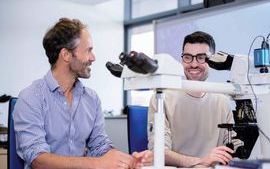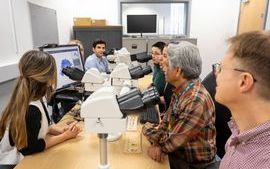- Published:
- 22 April 2025
- Author:
- Ronan McMullan & Joanne Brinklow
- Read time:
- 5 Mins
The 2021 Royal College of Pathologists’ specialty curricula emphasise the importance of doctors in GMC-approved training programmes demonstrating achievement of high-level learning outcomes for the award of a certificate of completion of training (CCT) in the cellular pathology specialties, chemical pathology, medical microbiology and virology. In parallel, there is less emphasis on strict counting of time spent in a recognised training programme in comparison with previous curricula.
While indicative training times are provided in curricula, to facilitate planning within training programmes, expected CCT dates may be adjusted to ensure that the end of training aligns with achievement of the required entrustment level for each of the capabilities in practice (CiP), as well as completing all necessary examinations and assessments.
The College has recently issued guidance that supports increased flexibility in training times for doctors in GMC-approved programmes. This guidance sets out our approach to adjusting CCT dates through recognition of capabilities gained:
-
prior to entering a training programme
-
at an exceptional rate while in a training programme
-
while out of programme undertaking research or training (OOPR/OOPT).
The common process in all of these circumstances is an evaluation of the level of capability attained, usually undertaken by the educational supervisor, accompanied by an estimate of the remaining time likely to be required to complete training. This evaluation allows the indicative training time specified in the relevant specialty curriculum to be adjusted to reflect the training needs of the individual doctor. This should also take account of the examinations and assessments that have been, and have yet to be, completed.
We have produced a gap analysis form that educational supervisors should use to document that evaluation and the anticipated training time needed. In every instance, adjusting the CCT date is a decision taken by the ARCP panel, on behalf of the Postgraduate Dean, upon review of available portfolio evidence. This evidence includes support from the educational supervisor and the evaluation that they complete.
Our guidance has been informed by principles set out in the Gold Guide 2024 (10th edition) and recent guidance from CoPMED. It should be equally applied both to doctors in full-time and those in less than full-time training. For doctors in a dual CCT programme, there must be agreement that both specialty CCT dates will be the same, so that both are adjusted in parallel to maintain their coterminosity.
When bringing forward the CCT date because of exceptional progression through a programme, it must be evident that the doctor has demonstrated achievement of curriculum outcomes at a rate that is clearly ahead of the expected trajectory. In other words, there should be evidence of genuine exceptionality in the rate of progression in training.
When bringing forward the CCT date because of capabilities gained prior to entering a GMC-approved training programme, it is recognised that training and experience in either a different specialty or the same specialty (but outside an approved programme) may have led to relevant capabilities having been acquired. In general, it is more likely that experience in a different specialty would lead to acquisition of generic capabilities, while experience in the same specialty would lead to acquisition of generic and specialty-specific capabilities.
It is important that a doctor wishing to have such capabilities recognised should discuss this with their educational supervisor as soon as possible after entering a training programme. This is required to allow sufficient time to complete assessments needed to evidence those capabilities and to plan delivery of their subsequent training. Ideally, evidence obtained contemporaneously prior to joining the programme would be available to support and inform the approach to this process. The first ARCP in the programme is the appropriate point to determine whether the CCT date can be brought forward and set a revised CCT date.
The decision to bring forward CCT dates should be driven by the principle of educational attainment, without being unduly influenced by employment preferences. At the same time, consideration should be given to the need for planning and the possible impact on other doctors in the training programme. With that in mind, it is expected that the final opportunity to bring forward a CCT date will be the penultimate ARCP.
Recognising capabilities gained while OOPT/OOPR is not a new concept. However, the move to capability-based curricula has driven a change in the approach to ‘counting’ time out of programmes towards training. Previously, when OOPT or OOPR was planned, a decision was made prospectively about the period spent OOP that could be counted towards training time. While it is still important to seek prospective approval for OOPT and OOPR, and it is helpful to estimate the duration of OOPT/OOPR that will be counted towards indicative training time, this can only be confirmed upon return to programme.
It follows that, since ARCPs typically lead to a progression decision being made based on learning outcomes achieved during the preceding period, it is appropriate that learning outcomes achieved during OOPT/OOPR should be determined retrospectively at the ARCP upon return to the training programme. At present, the Gold Guide does not endorse counting other types of out of programme periods towards indicative training time. We anticipate that, if this changes, the College would adapt to apply the principles that we have set out for OOPT/OOPR to other types of OOP periods.
Experiential learning within training programmes is highly valued. Therefore, it is anticipated that a CCT date would not be brought forward by more than 12 months as a result of recognising capabilities acquired before joining a training programme and/or exceptional progression through a programme. In other words, while a doctor may have capabilities gained prior to joining a training programme and also have exceptional progression through the programme recognised towards an adjusted CCT date, the combined effect of these should not bring the CCT date forward by more than 12 months. Nonetheless, bringing forward a CCT date because of either of these reasons does not preclude OOPT and/or OOPR of up to 12 months, also being counted towards training time.
In recommending doctors for the award of the CCT, the College is responsible for confirming to the General Medical Council that each doctor has satisfactorily completed the requirements of their curriculum. We hope that these recent College guidance documents will provide a useful operational framework to evidence the adjustment of CCT dates, while supporting greater flexibility in medical careers, to facilitate a more individualised approach for each doctor training in our pathology specialties.
Read next
Reasonable adjustments for trainees
22 April 2025
Safety – the science behind the cure
22 April 2025
Overcoming challenges in pathology training
22 April 2025





